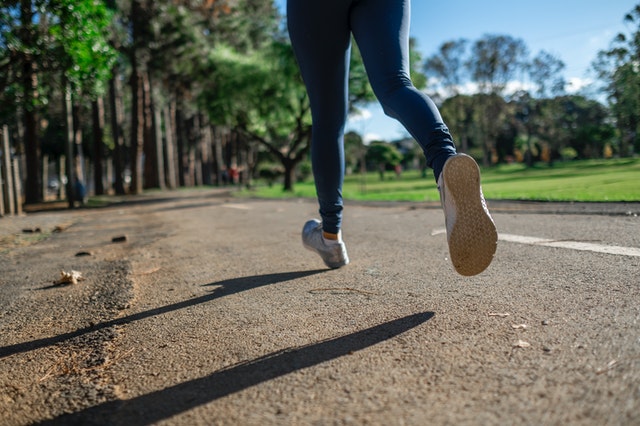The Truth About Running for Weight Loss: Can You Lose Weight from Running?5 min read
There is a lot of misinformation out there about running and weight loss. Some people believe that running is the best way to lose weight, while others think that it is ineffective and even dangerous. So, what is the truth? Is running a good way to lose weight? Let’s take a look.
Running is a form of exercise that has long been associated with weight loss.
Running is one of the most efficient forms of cardio because it raises your heart rate significantly while using large muscle groups at once. It also strengthens leg muscles which aids in keeping your bones stronger.
People choose to run because it doesn’t require equipment, so it’s easy and free to do.
The weight loss resulting from running has sparked differences. Some people lose weight, some others gain weight instead when they run.
Before we get into the correlation between running and weight loss, let’s look at what weight loss is.
Running for weight loss, how do you lose weight?
You might have heard the term calorie deficit. Weight loss is exactly that. Weight loss is the process of burning more calories than you consume. To put it simply, to lose weight, the calories going into your body have to be less than the calories going out of your body. Calories in < calories out. Running for weight loss is a great part of getting into calorie deficit.
Weight loss can happen as the result of dieting, exercise, or both. It’s important to note that even when weight loss has been successful, it doesn’t mean all types of weight have been lost- just fat and not muscle or water for example. You shouldn’t be discouraged if your scale isn’t moving because there are many other ways to track progress besides weighing yourself!
Instead of tracking the numbers on the scale, it’s more effective to track your body measurement by jotting them down and comparing your body measurement before and after your weight loss program.
You can also try on your old shirt or jeans that are tight or don’t fit you anymore, or take a picture of yourself in a mirror before you start your weight loss journey, and take another picture after a few months of your weight loss program. If you see a big difference, then you’re doing great!
However, there’s a lot of misconception about eating fewer calories. People often interpret this as eating as little as possible to the point where they starve themselves, or completely avoid certain foods, and this is not true.
Watching the quality of food that you eat and sticking to a diet that you can do for the long term is the most effective way. For example, if you usually eat fast food sandwiches or burgers for breakfast, you should change it to greek yogurt or a smoothie bowl with mixed berries, granolas, and chia seeds. This surely is a healthier option than fast food, and it’s delicious that you can sustain the diet.
Benefits of running
Getting your body moving is important for your overall health. Running, in particular, has a lot of benefits, including:
- regulating metabolic rate
- reducing stress which contributes to weight management
- helps manage systemic/chronic inflammation
- improves the quality and quantity of skeletal muscle mass
- contributes to body fat reduction
- Reduce the risk of heart disease
- Helps control blood flow, control blood pressure, and cholesterol
So, does running help with weight loss?
The answer is a little complicated.

There are many factors that contribute to weight loss, including the intensity and duration of your run, the type of foods you eat, and how active you are outside of your runs. Generally speaking, running can be an effective way to lose weight as long as you are burning more calories than you consume, and your run has to be variative.
If you have never exercised before, and then you start running even if it’s just for 10-15 minutes a day, you will surely lose some weight without changing your food.
However, when your running becomes a routine, for example, you routinely run for three days a week with the same amount of time for a few months and there’s no change in your diet, your body will start to adapt and your weight will stay the same.
This is why some people gain weight even if they run. A lot of people think that after they go for a run, they can “reward” themselves because they burn a lot of calories from the same running routine that they’ve been doing for some time.
This happens because their running routine stays the same for a period of time, but they increase their food intake.
How to lose weight from running
To lose weight from running, you need to mix up your running routine. You can do this in many ways, such as:
- Going for a longer run
- Go faster for 1 minute, then slow down for 30 seconds
- Go run in the mountains or hills to get more intensity
Basically, some changes on your regular running routine will definitely contribute better to your weight loss journey.
You can also mix up running with other types of exercise, including weight lifting or HIIT workout. Keep in mind though that lifting weight should be done before a cardio workout because if done otherwise, you’ll lose the energy to lift the weights from your cardio workout.
The most important thing to keep an eye on is your food. As mentioned above, a lot of people think that as they burn more calories from their run, they can reward themselves by eating more. Running burns about 100 calories per mile, whether you go fast or slow, so running is not a huge calorie burner.
Watching your diet is the most important factor in weight loss. Pairing it with running will definitely help you lose weight.

Avoid these common mistakes
Plan your meal carefully to prevent overeating pre, post, and during your run.
If you’re not running a marathon, then drinking water is the best fuel that you need for your run, before and during your run. A lot of people make mistakes in fuelling themselves with sports nutrition during their shorter runs when they don’t really need to. You also don’t need to have a big meal before your run.
After your run, drink lots of water and wait for about 40 minutes before having a meal.
Avoid drinking energy drinks as they have a lot of sugar in them. Instead, plan your snacks carefully by consuming healthier food, such as yogurt, fruits, smoothies, or teas.
How to start running
Always start small and then you can gradually increase the intensity to avoid injury.
Prepare your running shoes, and watch your form when you run. Make sure that you land on your foot flat and keep your arms on your side, not crossing in front of your body.







3 Comments